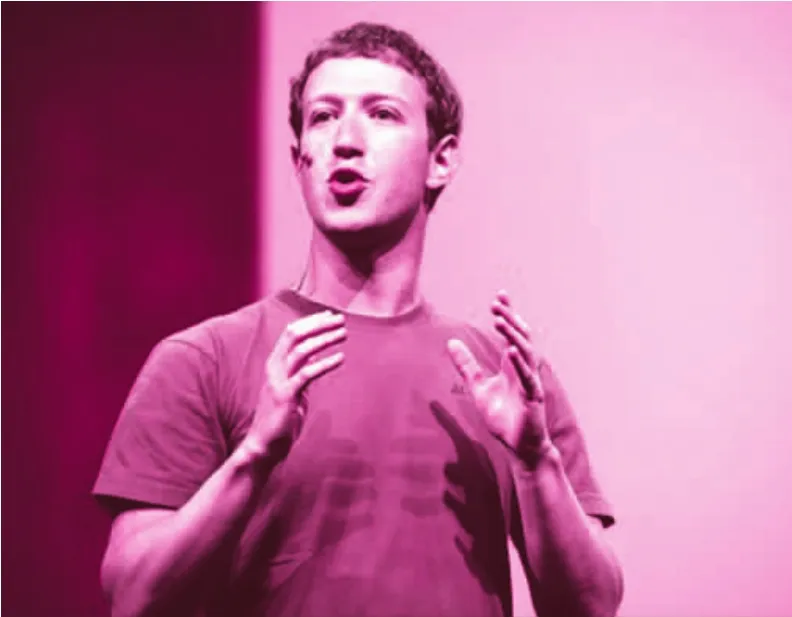Mark Zuckerberg's address at Stanford University
By Sophie
在这篇演讲中,扎克伯格谈了社交网站Facebook的创业过程,包括产品开发、团队建设、创收、企业管理技巧、新领域投资以及未来的挑战等。
I actually studied Psychology in Harvard,not Computer Science.Although a little bit of Computer Science.I've been programming since I was ten.And I think that it kind of like went,reach the point where went into my intuition.
I’m not really thinking that much about it consciously.So that was pretty good.And then,I mean when I started thinking about all the people issues and doing Psychology,it was like being in the university interacting with a lot of people,that it kind of occurred to me that this would be something I was interested in,and like I knew how to do it so I just do it.I mean,it took me like a couple of weeks here,even less,putting together the site.
And I remember that by the time I was done putting together the site.I had no idea how successful it could be.And I was actually thinking that after day in and day out.I had a different idea that I wanted to do,and I was going to scrap it after that.So I'm happy that I didn't do that.So I think that it’s more like how you spend your time doing stuff type of question,or type of answer than like something that I’ve learned specifically from college.
I made a ton of random things when I was at Harvard and most of them no one ever saw.A lot of them just weren’t meant for other people to see.And there are thing that I made for myself because I thought they’ll be cool.I used to make stuff like the natural language interface to play my MP3.Or a thing I made before,this was a Hot or Not program out of everyone’s IDs at Harvard,that almost got me kicked out.
So I don’t know,I actually spent a long time making random stuff.I think that that definitely made it.So by the time it came,more like,by the time I came to meet this random project.I was pretty well tuned toward making that,you know in terms of managing this whole process,nothing.Like I have no idea what I’m doing,you know.
When you're running a site,and you're four people,are on the kitchen,your operating expenses are relatively low.So traditionally,what we’ve done was we had a vey small sales force,and we sell some ads.You might see them on the site,and we just keep our operating expenses low so far and by doing that,we've been able to stay cash flow positive for basically the entire existence of the company.
After we took some money from this guy,we decided that it is OK to go a few months in casual negative.While(Jim)Barely any cash flow.Yeah,at a point,you know.Losing like a$100,000 a month,not millions.So,and then...Now we're back.And we do a lot of page views.I think that it's not something that you really think about,because you probably just think about this as a Stanford site.
But everyday,we do more than 200 million page views.I think recently were up to 230 million.By the end of,like two weeks from now or so.We're going to pass Google in page views.That’s a lot,right?You don’t normally think about it in that kind of application.Like,I think,you know,I was pretty surprised when I heard that.

But when you have that many page views and that many people spending much time on the site.You can monetize it pretty easily just by putting matters on there.The revenue,we’re generating over million dollars a month in revenue,and well more,and that way covers our expenses,and we’re not even doing anything cool yet.
We're designing stuff,we look not necessarily just about what any given users going to experience,but what’s going to be better for the whole coummunity and the whole product.And I mean,it's gonna be a lot of trade-off going all over the place in a product.Probably the most that you see every day is that you can’t see the profiles of peo ple at other schools.That’s a really a major trade-off in the application.
For those of you who aren’t familiar with this,we spilt up the user base by what school they go to and we make it so that people at a given school can only see the profiles and contact information of people at their school.And the reason for this was mostly to,because we realized that the people around you,at your school,are the people who you want to look at mostly anyway.And if we made the space too broad and let anyone see your information.Then that probably fine.I mean,look up some people,but you also probably won’t put up your cellphone.
More than a third of people on Facebook have their cellphone up there,and that's something useful for the application.So in designing it,this was a trade-off that we made.I kind of thought of what was wrong.I said,well,what would be more useful?Would it be better for people to be able to see everyone and maybe not feel like this is a secure environment in which they can share their interests and what they thought and what they care about?Or would be better that more information and more expression was available,but to a smaller audience which is probably the relevant audience for any person?So,there are a lot of decisions like that,that are getting made and a lot of them are gut level.

So I mean,we tried to be as academic about this possible in trying to think rigorously through the different results that we’ll get if we go to different directions.But a lot of it is just like you define your objectives,what you’re going for.In this case,to optimize for the best of the whole community and the whole user base and over the long term,and that’s important too,long term but short term.And then,you just kind of operate and do what you think will be best along that line.
其实我在哈佛念的是心理学,不是计算机。但也学了点计算机,我从10岁就开始编程,我觉得编程已经成了我本身的一种技能。
我在写程序时不再会有意识地想该怎么做。这种感觉很好。当我在学心理学的 时候,开始思考人与人之间的关系,这就好像在大学里读书,去结识很多的人,我觉得我会对这些很感兴趣,我知道该怎么做,然后就做了。我只花了几周甚至更少的时间建立了这个网站。
我记得当我建好网站后,我不知道这个网站会不会成功。我真的在想,等我有了新点子想去实践时,我就把这个网站丢弃不管了。现在我很庆幸当初没那么做。 所以我觉得这个问题的关键更在于你如何支配自己的时间去做各种事情,而不在于你我在大学里学到了什么具体的技能。
我在哈佛时编了很多各式各样的程序,大多数没有人见过,因为那都是为我自己编的,我为自己编程序,因为我觉得那很有意思。我为我的MP3做了一个自然语言界面,之前还用哈佛每个人的ID做过一个类似Hot or Not的网站,我曾因此差点被哈佛开除。
我真的花了很多时间编写各种奇怪的程序。这对我后来做的事很有帮助。当这个奇怪的点子冒出来的时候,我已经准备得比较充分,可以实现它了。但说到怎么规划整个过程,我没想过,我都是想到什么做什么。
当你经营一个网站时,你们有四个人,围坐在餐桌旁工作,你的运营成本是比较低的。之前我们一直只有一个很小的销售团队,主要靠广告赚钱。你巳经在网站上看到了,而且我们一直努力将成本控制在最低,这样一来,我们就能保持现金流入大于现金流出,基本上公司创办以来一直是这样的。
所以当我们从这个家伙(吉姆布雷耶)那里得到一些钱后,我们决定允许几个月让现金流出现负值,可是吉姆基本上没有什么现金流。对,就是有段时间,一个月损失10万美元,不是几百万,不过现在好了,我们的页面访问量很大,大家可能不会仔细去想这个,因为你可能只把它当做一个斯坦福的一个网站。
可是每天,我们都有超过2亿的页面访问量,最近升到了2.3亿。这样算来,两周后,我们就能超过谷歌的访问量。很多吧!以前你可能从没想过这种网站会那么受欢迎,我第一次听说时也很吃惊。
但是当你有那么多的访问量,那么多的人花大量时间在你的网站上,你单靠投放广告就能轻松赚钱,我们每个月都有超过100万的营业收入,可能更多,这早就超过了我们的开支,关键的这是我们还没使用任何出色措施的情况下。
当我们设计应用程序的时候,我们并不注重单一用户的使用体验,而更关注其是否有益于与整个社区和产品。这就需要在开发产品的各个环节进行取舍。可能你 注意到你不能浏览其他学校的人的信息。这就是一种取舍后的结果。
你们有些人对此不太了解,我们将用户按照学校分类,所以只有来自相同学校的人才能互相看到对方的信息和联系方式。之所以这样做,是因为我们发现人们更乐于关注身边的人的信息。如果我们把空间扩展到所有人都可以浏览你的信息,那可能也不错,谁你都找得到,但是可能你就不愿意把你的手机号码放上去了。
超过三成的Facebook用户在注册时登记过电话号码,这对我们的应用程序是很重要的。所以在设计产品的时候就要做这种取舍。我觉得这样做好像不对,一直在想什么会更有用?将用户的信息对所有人开放是不是更好一些呢?但这却会让人们觉得在这样的网络中分享自己的所感所想不太安全。或者仅将更多的用户信息和状态展示给少部分与该用户有关的人更好一些呢?我要做很多类似的决定,而且这些决定是要靠直觉判断的。
因此,我的意思是,我们一直努力以最学术的态度去谨慎地思考不同方式所能产生的不同结果。但多数时候,你得先确定你的目标,你想要的是什么。对我们来说,是寻求长期的整个社区及用户群体的利益的最大化,注意是长期的,而不是短期的。然后就是为更好地达到这一目标而努力。

